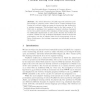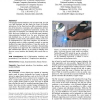104
click to vote
CCS
2004
ACM
15 years 7 months ago
2004
ACM
We examine the problem of providing useful feedback about access control decisions to users while controlling the disclosure of the system’s security policies. Relevant feedback...
107
Voted
AH
2004
Springer
15 years 7 months ago
2004
Springer
Abstract. The virtual laboratory (VILAB) supports interactive problem solving in computer science with access to complex software-tools. During the problem solving processes the le...
120
click to vote
ETRA
2004
ACM
15 years 7 months ago
2004
ACM
Eye typing provides means of communication especially for people with severe disabilities. Recent research indicates that the type of feedback impacts typing speed, error rate, an...
94
Voted
FSKD
2005
Springer
15 years 7 months ago
2005
Springer
In linear text classification, user feedback is usually used to tune up the representative keywords (RK) for a certain class. Despite some algorithms (e.g. Rocchio) deal well with...
GROUP
2005
ACM
15 years 7 months ago
2005
ACM
Many virtual communities involve ongoing discussions, with large numbers of users and established, if implicit rules for participation. As new users enter communities like this, b...
117
Voted
WOWMOM
2006
ACM
15 years 8 months ago
2006
ACM
Opportunistic scheduling can significantly improve wireless network performance by exploiting the feedback information that conveys the underlying channel condition. In emerging ...
100
click to vote
UIST
2006
ACM
15 years 8 months ago
2006
ACM
Current paper-based interfaces such as PapierCraft, provide very little feedback and this limits the scope of possible interactions. So far, there has been little systematic explo...
109
click to vote
SIGIR
2006
ACM
15 years 8 months ago
2006
ACM
Pseudo-relevance feedback has proven to be an effective strategy for improving retrieval accuracy in all retrieval models. However the performance of existing pseudo feedback meth...
147
click to vote
ICALT
2006
IEEE
15 years 8 months ago
2006
IEEE
Feedback is information that is provided to a user to inform him/her about the result of his/her action and to motivate him/her to further interact with the system. In web-based l...
113
click to vote
IVA
2007
Springer
15 years 8 months ago
2007
Springer
Just like humans, conversational computer systems should not listen silently to their input and then respond. Instead, they should enforce the speaker-listener link by attending ac...


